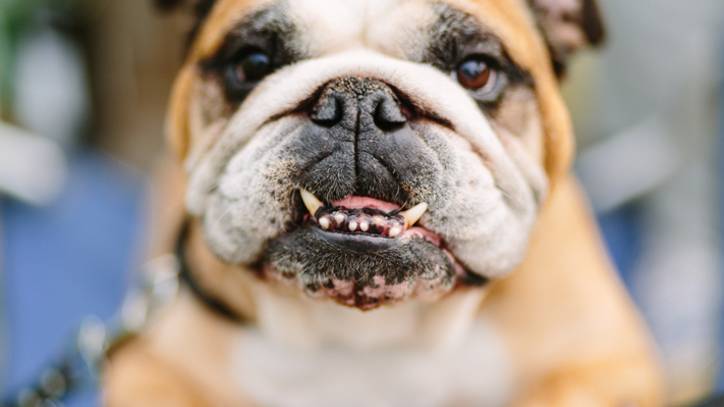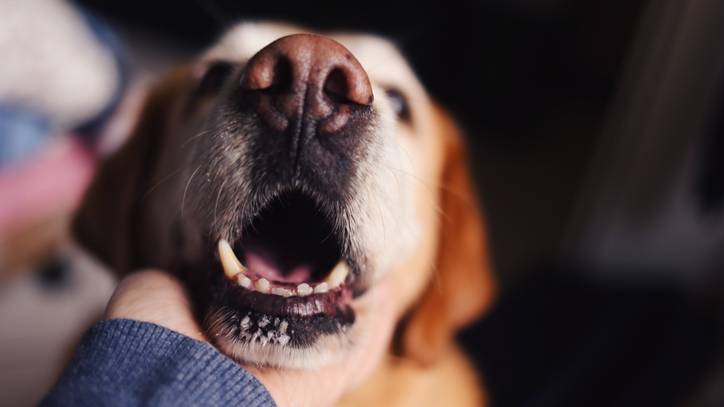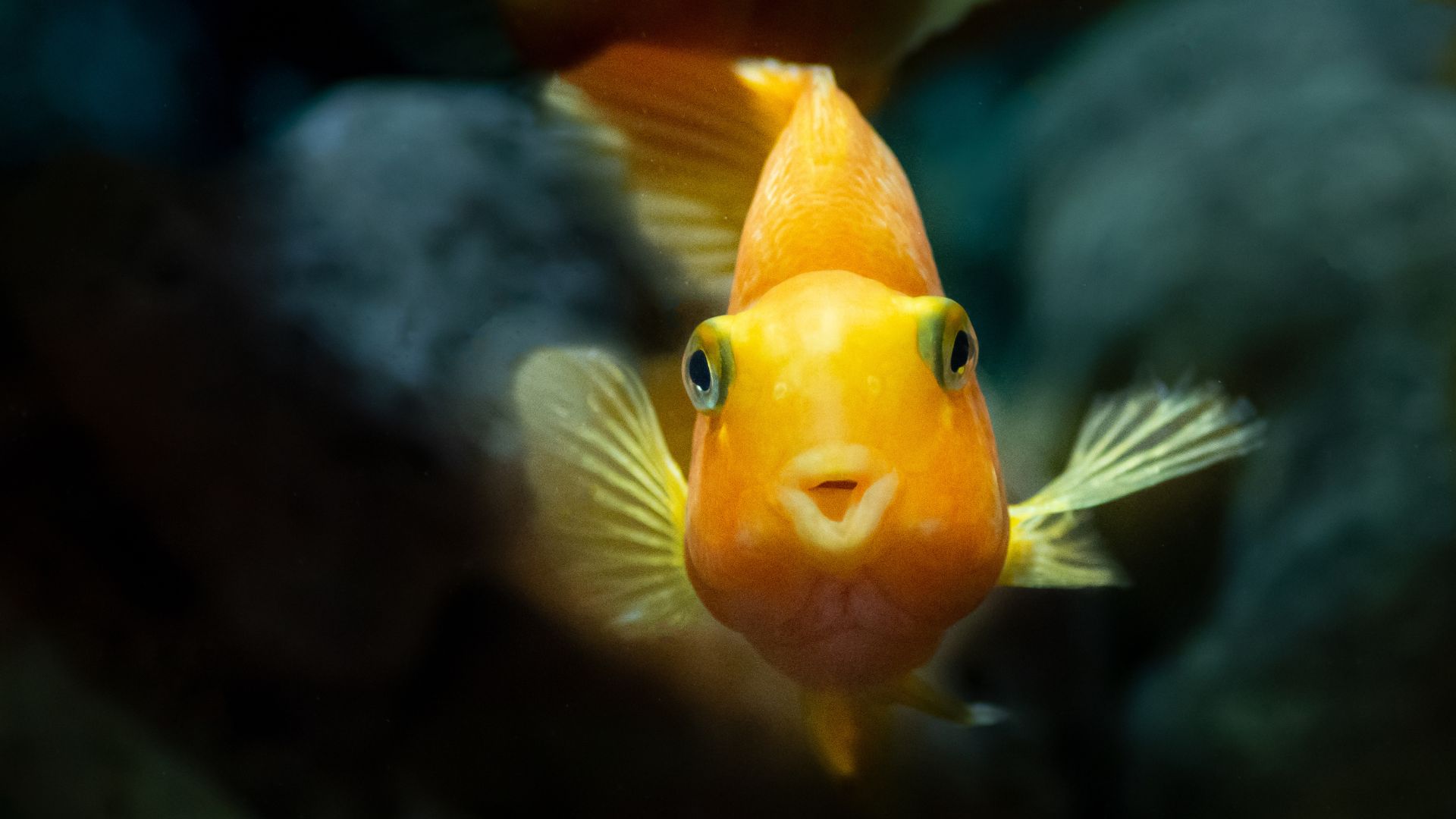Why are my dog’s teeth chattering? A Vet answers
Dog teeth chattering may look cute, but it can be a sign of a problem!

If you’ve ever seen your dog chatter his or her teeth, you may have wondered why they exhibited this unusual behavior. Sometimes dog teeth chattering is benign and no cause for concern, but occasionally, it can be a sign of a serious problem.
Knowing the signs of dog teeth chattering and the potential causes is important so that you know how to handle this behavior if you see it. Is it simply a sign your dog is cold or might you need to take them to a veterinarian for further evaluation of the behavior?
Read on to learn more about dog teeth chattering, why it happens, and what you should do if your dog’s teeth start to chatter.
Signs of dog teeth chattering
It’s not common for dogs to chatter their teeth, but when they do, it is usually pretty obvious. You may see your dog’s jaw trembling and hear the sound of his or her teeth clicking together. Your dog may also seem anxious or uncomfortable.
If you’re unsure what it looks like when a dog’s teeth are chattering, there are many videos available on YouTube and TikTok showing dogs with their teeth chattering to give you a better idea, so you can more easily identify this behavior in your own dog.
Causes of dog teeth chattering
Possible causes of teeth chattering in dogs include:
Cold
Like humans, dogs shiver to warm themselves up when they are cold. Significant shivering can cause a dog’s teeth to chatter just like a human’s. But if your dog’s teeth are chattering when it’s not cold outside, this can be a sign of another problem or a potential health concern.
Anxiety
If your dog’s teeth are chattering, this can be a sign of fear and anxiety. Some dogs will chatter their teeth when they are nervous or uncomfortable with a situation. This is often accompanied by other subtle signs of dog anxiety, such as whale eye, yawning, looking away, lifting a paw, placing the ears back, and crouching.
If your dog’s teeth are chattering or he is showing other canine anxiety symptoms, it’s time to remove him from the situation at hand and give him extra space. Forcing a dog to stay in a situation that makes them anxious can cause behavior problems, worsening fear and anxiety in the future, and can even cause them to escalate up the canine ladder of aggression to growling, snapping, or biting.
In this case, teeth chattering is an important indicator that your dog is uncomfortable and needs a change in his or her environment!
Oral pain
In some cases, dog teeth chattering can be a sign of dental or oral pain. Dental disease is very common in dogs, with an estimated 80% of dogs over the age of three having some degree of dental disease. Dental disease causes more than just bad breath for your pup - it can also lead to inflammation and pain.
Other causes of oral pain can include oral masses, fractured teeth, and arthritis of the temporomandibular joint (TMJ).
Signs of dental disease and oral pain can include bad breath, difficulty picking up and chewing food, reluctance to eat hard foods, drooling, red inflamed gums, and dark build-up on the teeth. If you suspect your dog has dental disease or oral pain of any kind, a visit to your veterinarian is in order to address the problem!
Gastrointestinal disease
Dog teeth chattering can also be a sign of gastrointestinal pain or GI disease. One common gastrointestinal problem that leads to teeth chattering is gastroesophageal reflux disease, also known as GERD. This occurs when acid from the stomach refluxes into the esophagus, causing pain and ulceration, similar to heartburn in humans.
The resulting pain can cause dogs to chatter their teeth. If your veterinarian suspects a GI problem causing your dog’s teeth to chatter, he or she may recommend a change in diet, a change in the size or frequency of your dog’s meals, or a trial of medication. In many cases, these interventions can address the underlying cause of the chattering teeth and stop the problem.
Neurologic disease
While it’s scary to think about your dog having a neurologic disease, in some cases, dog teeth chattering can be caused by focal seizures or other neurologic abnormalities. Dogs with distemper encephalitis may exhibit “chewing gum fits”, so named because of the abnormal mouth movements that look almost like the dog is chewing gum.
If your veterinarian suspects a neurologic cause for your dog’s teeth chattering, a full neurologic exam will be performed. Your veterinarian may also recommend additional diagnostic testing such as blood work and diagnostic imaging to look for the source of the problem.

What to do if your dog’s teeth are chattering
If your dog’s teeth are chattering, first take a look at your dog’s environment to see if you can spot the potential trigger for this behavior. Is your dog very cold and shivering? Is there a threatening stimulus around, such as another dog, an unfamiliar person, or a potentially disturbing noise?
Is your dog showing signs of anxiety such as trembling, whale eye, looking away, crouching, or even growling and snapping? Does your dog show any signs of being in pain? This information can help you narrow down the list of potential causes for dog teeth chattering.
Changing your dog’s environment by moving indoors, separating your dog from potential stressors, and giving your dog a safe, warm, quiet place to relax will likely resolve the teeth chattering quickly and easily.
If your dog’s teeth chattering has happened before, it’s a good idea to take a video of the behavior to show to your veterinarian. This will help your veterinarian determine whether the behavior is neurologic or due to pain or anxiety. Be sure to get a clear view of your dog’s whole face, as well as the surrounding environment, if possible.
When to see a vet
If your dog’s teeth chatter once or twice and it appears to be related to temperature or anxiety, you likely don’t need to make a special visit to your veterinarian.
However, if your dog’s teeth are chattering more than once or if the chattering is not related to temperature or environment, then it’s best to see your veterinarian for an examination. Your dog’s teeth chattering could be due to pain, gastrointestinal disease, or a neurologic problem.
Your veterinarian will perform a full head-to-tail physical examination and may recommend some additional diagnostic testing to fully evaluate your dog’s condition.
Once the underlying cause of your dog’s teeth chattering has been diagnosed, your vet will be able to prescribe appropriate treatment to address the condition and resolve the chattering.
PetsRadar Newsletter
Get the best advice, tips and top tech for your beloved Pets
Dr. Elizabeth Racine is a small animal general practice vet covering all things pet health and wellness. Her special interests include veterinary behavior, nutrition, and internal medicine.
As a freelance writer, Dr. Racine has written content for major companies in the industry such as the American Kennel Club, Merck Animal Health, Bayer PetBasics, Elanco, and CareCredit. In her free time, Dr. Racine enjoys playing trampoline dodgeball, hiking with her beagle Dasher, and spending time with her three mischievous cats.

